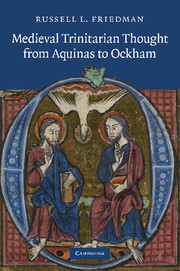Book contents
- Frontmatter
- Contents
- Acknowledgments
- List of symbols, abbreviations, and conventions
- Introduction
- 1 The Trinity and the Aristotelian categories: different ways of explaining identity and distinction
- 2 The Trinity and human psychology: “In the beginning was the Word”
- 3 The Trinity and metaphysics: the formal distinction, divine simplicity, and the psychological model
- 4 The Trinity, divine simplicity, and fideism – or: was Gilson right about the fourteenth century after all?
- Appendix: Major elements in Franciscan and Dominican trinitarian theologies
- Bibliography of primary sources
- Annotated bibliography of selected secondary literature
- Index
- References
2 - The Trinity and human psychology: “In the beginning was the Word”
Published online by Cambridge University Press: 26 February 2010
- Frontmatter
- Contents
- Acknowledgments
- List of symbols, abbreviations, and conventions
- Introduction
- 1 The Trinity and the Aristotelian categories: different ways of explaining identity and distinction
- 2 The Trinity and human psychology: “In the beginning was the Word”
- 3 The Trinity and metaphysics: the formal distinction, divine simplicity, and the psychological model
- 4 The Trinity, divine simplicity, and fideism – or: was Gilson right about the fourteenth century after all?
- Appendix: Major elements in Franciscan and Dominican trinitarian theologies
- Bibliography of primary sources
- Annotated bibliography of selected secondary literature
- Index
- References
Summary
Thus far we have traced the origins and the development in the later thirteenth century of two approaches to the major challenge in trinitarian theology. That challenge is to explain how the three divine persons, the Father, the Son, and the Holy Spirit, can be distinct from one another personally, and yet identical with one another in the one simple divine essence. As detailed in Chapter 1, the two rival ways that arose of tackling the challenge were the relation account of personal distinction, held to mostly by Dominicans, and the emanation account of personal distinction, held to mostly by Franciscans. These groups each developed a set of fairly stable positions and arguments flowing out from a conception of the divine personal properties as relational or as emanational, respectively, and in this sense one can claim that they were rival trinitarian traditions.
There is yet another immensely important element in the trinitarian theology of the late thirteenth and early fourteenth centuries, and it is this element that I will discuss in the present chapter as well as in Chapter 3: the psychological model of the Trinity. According to the psychological model, human psychology – the study of the human soul, and particularly the human mind, its architecture and its activities – can be employed to explain or clarify the Trinity. The present chapter deals with the rise among Franciscans of the psychological model of the Trinity as the major way to explain the identity and distinction of the trinitarian persons.
- Type
- Chapter
- Information
- Medieval Trinitarian Thought from Aquinas to Ockham , pp. 50 - 93Publisher: Cambridge University PressPrint publication year: 2010
References
- 1
- Cited by



